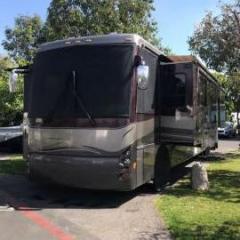-
Content Count
18 -
Joined
-
Last visited
Content Type
Profiles
Forums
Blogs
Gallery
Everything posted by sfroese
-
Of course I do. Just because it's old doesn't mean it's not relevant.
-
I think the author is stating the plug is RATED for 240V, not that it's actually putting that voltage out. As my friend Bill stated, these adaptors do not change the voltage. If it is 3-prong receptacle, it is 120V.
-

Xantrex 458 inverter starts for no apparent reason
sfroese replied to tcolburn's topic in Electrical
it was likely a fault with the LV board. -

What cable gauge needed when adding house batteries?
sfroese replied to Rlgabriel's topic in Electrical
It depends how many amps you are pulling out and putting in during charging. If you have a trailer, 2 or 4 is sufficient, but if you have a motorhome with a large alternator and/or inverter/charger, you might consider as large as 1/0. In the case of a motorhome, I definitely wouldn't go smaller than 2, but you may notice the cabling from the chassis and inverter may be as large as 1/0. -
This is the FMCA forum moderator. Let me see if I can dig up more information regarding better access to the roadside assistance number.
-
Just a note, although a DC-DC charger is the best option, you don't need one. You can also use a Li-BIM isolator. Much easier to wire up. Also, the cost of ownership of LiOn over the cost of their lifetime is much lower than the alternatives, and the power vs. weight is much more favorable, as LiOn are roughly half the weight per Ah as lead-acid. Lots of advantages vs. a few disadvantages. I just upgraded to LiOn while camping last week. Took me about an hour, although it could take longer, depending on what charging and isolating technology you use. your friendly neighborhood moderator
-

Xantrex 458 inverter starts for no apparent reason
sfroese replied to tcolburn's topic in Electrical
Could be a short in the RJ-11 or in the RCU (remote unit) itself. Also, make sure the power switch on the inverter is turned off (to allow the RCU to control the unit). Did you try leaving the RJ-11 unplugged to see if the inverter turns on? Try that, and if the problem goes away, the issue is with the remote cable or remote control unit. Doubt unplugging the negative will work - electrons flow from negative to positive, but they won't flow at all if you disconnect either one. Although in all my years as an aerospace engineer, I have seen stranger things -
As BIll mentioned, most inverters automatically pass-through the incoming AC voltage automatically with no user intervention. A select few need to have this feature manually activated, but most don't. You should ensure that both the inverter breaker in the main panel, as well as all the inverter branch circuits in the sub-panel are not tripped. If you have a multimeter and are comfortable using it, you should measure the AC voltage at the inverter with the Inverter turned OFF, because you have to make sure the 120VAC is coming from the shore power, not the inverter output. Alternately, you may disconnect the inverter from the battery bank and make sure you still have AC voltage at the inverter. That is the first thing to verify. It is possible, but hopefully not likely, that your bypass circuit in the inverter has failed.
-
I get it, methinks its out of date
-
Yes, I was able to help him. Note there is only one moderator for the forum as far as I'm aware. Administrators are different things, as they keep the IT infrastructure and websites running. Not sure if you were simply mixing up the terms or not.
-
Ok, I'll try to reach out...
-
Hi, it's Steve the moderator.... How may I be of assistance?
-
If you're going to leave your RV plugged in over the winter, the following is very important: in the case of non-maintenance-free batteries, check them frequently to make sure the electrolyte isn't boiling off. Be sure to top up the cells regularly if you don't have a 3-stage charger, you risk overcharging the battery. The charger must have a float stage Keep the terminal connections clean. Clean off any acid that forms and use baking soda solution to help keep it clean
-
I currently run a Newmar Diesel pusher with 4x Costco 6V batteries. They work great, are inexpensive, and easy to source. Of course Interstate batteries are also great. As others here have pointed out, if you rarely dry camp, it's largely a moot point. Just be sure to maintain the electrolyte level and keep the terminals clean.
-
Better late than never, but I wanted to point this out. LP gas IS heavier than air and will therefore sink, hence the floor-level location of the LP detector. However, CO will MIX with air and DOES NOT RISE. Therefore, CO detectors are ideally mounted knee-height or lower. That is why combination LP/CO detectors are effective, since CO detectors work just as well at floor level than higher.

